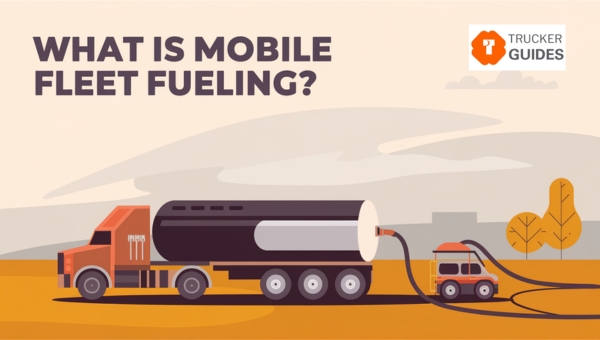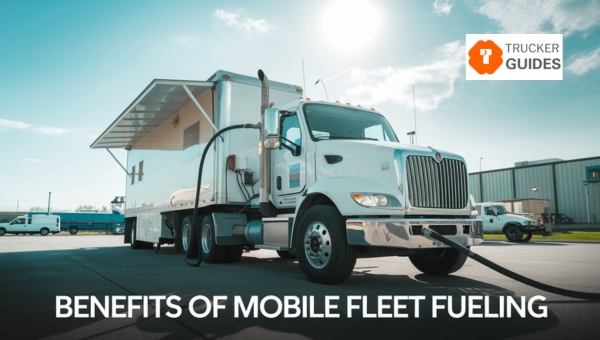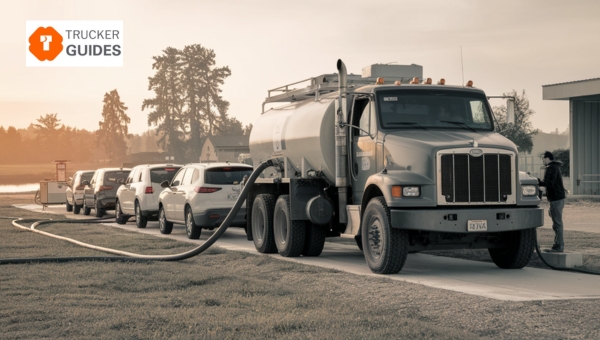Top 50 Mobile Fleet Fueling Companies of 2024 [Comprehensive Guide]


Are you curious about the benefits of mobile fleet fueling and how it works? You’re in the right place! In this article, we’ll explore the ins and outs of mobile fleet fueling, uncovering its convenience, cost savings, flexibility, and efficiency.
We’ll also tackle potential challenges and offer solutions, ensuring you have all the information needed to make informed decisions.
Mobile fleet fueling, also known as mobile refueling or wet-hosing, is a service that delivers fuel directly to vehicles, equipment, or stationary tanks at their location. This method eliminates the need for drivers to travel to gas stations, thereby reducing downtime and increasing productivity.

Mobile fueling has gained traction since the late 1990s, particularly after regulatory changes prompted businesses to reconsider their fuel delivery options. It is especially beneficial for fleets with off-road fuel needs or high labor costs, allowing for more efficient operations and cost savings.
Also Read: 10 Best Appointment Setting Services to Boost Efficiency
Exploring the benefits of mobile fleet fueling opens up a world of advantages for businesses. From convenience to cost savings, flexibility, and efficiency.

Each aspect plays a crucial role in the overall effectiveness of your fleet management.
Are you curious about how mobile fleet fueling operates? Let’s dive into the key steps involved in this efficient process.

From placing an order to fueling up on-site, we’ll break down everything you need to know about making your fleet fueling experience smooth and hassle-free.
Order placement is the first step in mobile fleet fueling. It begins with a company identifying its fuel needs and creating an order. This is typically done through a user-friendly online platform or application provided by the fueling service.
The order form will ask for details such as the type of fuel required, the amount needed, and the specific location where the fuel should be delivered.
Selecting a vendor is crucial to ensure quality and reliability. Once the order is placed, the next step involves choosing a suitable vendor to fulfill the fueling requirements. This process can include evaluating various vendors based on factors such as their reputation, fuel quality, and pricing.
Real-time tracking is a game-changer in mobile fleet fueling. It allows companies to monitor the delivery process from start to finish. This feature ensures transparency and helps in managing time effectively.
On-site fueling is the culmination of the mobile fleet fueling process. This step involves the actual delivery and fueling of vehicles at the specified location. The fueling team arrives equipped with all necessary tools and safety measures to ensure a smooth operation.
The team conducts a quick inspection of the vehicles to ensure they are ready for fueling. They then proceed to fill each vehicle with the required amount of fuel, carefully monitoring the process to prevent any spills or safety hazards.
After completing the fueling, the team provides a detailed report of the amount of fuel delivered, the time taken, and any other relevant information. This report helps the company keep track of its fuel consumption and manage expenses effectively.
Also Read: Best Construction Budgeting Software
When diving into the world of mobile fleet fueling, it’s essential to understand the possible hurdles you might encounter.
Knowing these challenges and their solutions can make your experience smoother and more efficient. Let’s explore some common issues and how to tackle them.
Safety is a top priority when dealing with fuel. The risk of spills, leaks, or even fires can be daunting. However, these risks can be managed effectively. Mobile fleet fueling companies use specialized equipment designed to minimize hazards.
For instance, trucks are equipped with automatic shut-off valves that prevent overflows. Drivers are trained extensively in safety protocols, ensuring they handle fuel with care.
Scheduling can be tricky when it comes to mobile fleet fueling. Ensuring that fuel deliveries align with your fleet’s availability requires careful planning. However, most companies offer flexible scheduling options to accommodate various needs.
They provide online platforms where you can easily book, reschedule, or cancel appointments. These platforms often come with reminders and alerts to keep you informed about your upcoming fueling sessions.
To make things even smoother, some companies offer 24/7 service, allowing you to schedule deliveries at times that are most convenient for you. This flexibility helps avoid interruptions in your fleet’s operations.
Maintaining high fuel quality is crucial for the optimal performance of your fleet. Low-quality fuel can lead to engine problems and increased maintenance costs. Mobile fleet fueling companies understand this concern and take several measures to ensure the fuel they deliver meets high standards.
They source fuel from reputable suppliers known for their stringent quality controls. Before the fuel reaches you, it undergoes multiple filtration processes to remove any impurities.
These checks include testing for contaminants, water content, and other factors that could affect performance.
Also Read: Hiring Guide for Small Business Owners [Your Ultimate Resource]
Selecting the ideal mobile fleet fueling company is crucial for ensuring your fleet operates smoothly and efficiently. The right choice can lead to significant benefits, including cost savings and increased productivity.
To help you make an informed decision, let’s explore the key criteria you should consider.
When choosing the right mobile fleet fueling company, consider the following key criteria:
Mobile fleet fueling provides a host of benefits, enhancing convenience, cost savings, flexibility, and efficiency. By understanding how mobile fleet fueling works and navigating potential challenges, businesses can make informed decisions to keep their fleets running smoothly.
Choosing the right mobile fleet fueling company is crucial to ensuring optimal service and fuel quality.